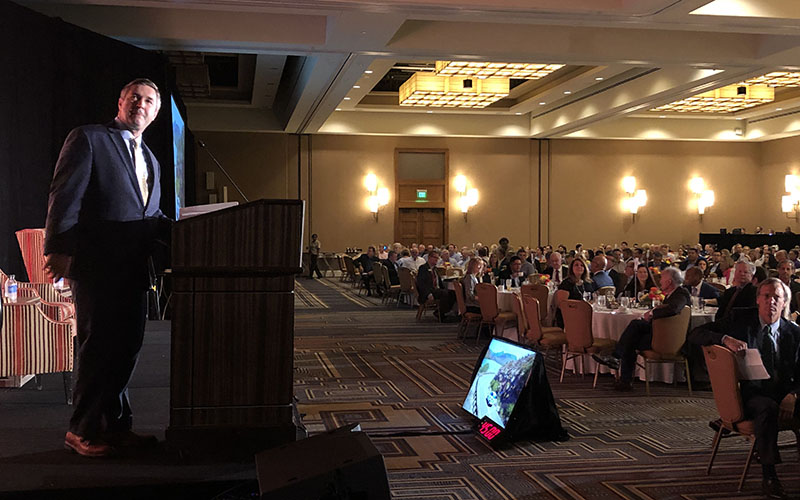SCOTTSDALE – Consumer spending is up and economic growth in Arizona and the rest of the U.S. is on the rise, but investor caution is one sign pointing to a potential recession in 2020, a global economist told Arizona business leaders.
“There is an undercurrent of alarm in this country that a recession is not only possible, but probable in the next year,” global economist Bernard Baumohl said this week at an economic session with local business leaders.
Business-capital investors are not buying at their normal rates and are being more cautious, he said at the annual SRP Economic Forecast.
He recounted a story of an investor who told him why his business would rather remain complacent than risk its assets to buy capital – “You can’t plan for crazy,” the investor said.
“We have the trade war, which has fluctuated between escalation and rising tensions, and some moments of cautious optimism,” Baumohl said. “Certain parts of the country are really affected by it, particularly the Midwest.”
He said the uncertainty about Brexit and other economic factors could push Europe toward recession. Also, it’s unclear if the U.S. will ratify NAFTA 2.0 – USMCA, “which is very important for the state of Arizona.”
Baumohl, head of the Economic Outlook Group and proclaimed by the Wall Street Journal as the most accurate economic forecaster of 2018, said a country with a 3.7% unemployment rate like the U.S. – Arizona’s rate is 5% – indicates a strong working class that still wants to consume despite China “having its boot on the neck of the United States” in the trade war.
“It is extremely difficult for a free market, open, highly liquid economy to fall into a recession in the first place,” Baumohl said. “Actions that will lead to another are acts of human folly – where we actually shoot ourselves in the foot,” referring to the subprime-lending crisis that led to the 2008 recession.
Arizona’s economic growth has been on pace with the rest of the U.S. over the past year. Its GDP, or gross domestic product, increased by 4 percent in 2018, as touted in a state news release based on data from the U.S. Bureau of Economic Analysis.
“We are really at a pivotal moment in U.S. economic history,” Baumohl said. “We’re now well into our 11th year of uninterrupted economic growth, and we have never seen that before. It’s absolutely unprecedented. The average number of years an economy usually experiences uninterrupted growth is less than five before it gets in trouble again.”
High consumer spending is typically a sign of a strong economy, along with the country’s currently low federal interest and inflation rates.
But Baumohl said such signs of optimism can be misread – rapid growth, low unemployment, consumer spending. It’s better to pay attention to businesses’ reluctance to invest as a symptoms of an economy that appears about to peak and then plunge.
A local panel of Arizona business leaders at the Thursday session also provided economic predictions.
Mesa City Manager Chris Brady said the recycling business is an economic stressor.
“This year, we are faced with significantly higher recycling costs here in Arizona,” he said. “If we go back in time, we think about how we were taught recycling was going to save the Earth, but now it comes down to the cost of doing it,” Brady said.
“It’s cheaper to put your plastic in a landfill.”
China decided to definitively stop accepting U.S. recyclables in 2018, according to NPR, banning almost all imports and driving up costs for recycling programs around the world.

